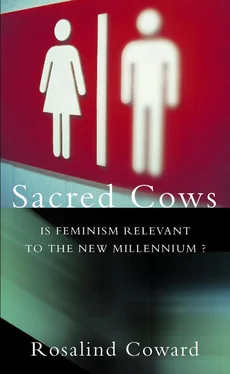Those women who fought the original battles suffer more than most. Hated and opposed when originally pushing down the barriers, they now often have to face contempt from a society which takes for granted their achievements. At a recent party I witnessed one such woman being challenged by a young man who had no sense of feminism’s history or her involvement in it. ‘Do you really call yourself a feminist?’ he asked belligerently. ‘Yes,’ she answered rather wistfully, ‘I’d still call myself that.’ ‘But what on earth does it mean?’ he continued. ‘I mean, is there really any need for it? Isn’t it just part of the way we are, part of our unconscious?’
It was a difficult and poignant moment for me, because it encapsulated both sides of my relationship with feminism. I greatly respected the woman for what she had achieved and deplored the man’s lack of respect for why she had placed herself as she did. In such circumstances, no wonder she dug her heels in. This continuing lack of credibility and acceptance explains why feminists react badly when the fundamental tenets of the movement are challenged. But when I began to examine feminist ideas critically and challenge the idea that nothing had changed, I too met with resistance. There is a real reluctance to submit feminism’s fundamental assumptions to an audit to see just how relevant they are to changing realities.
The problem is that, by and large, I also agreed with what the man at that party said. Somewhere along the line something remarkable has happened. Individual feminists still meet with resistance and problems, but feminism as a movement has been extraordinarily successful; it has sunk into our unconscious. Our contemporary social world – and the way the sexes interact in it – is radically different from the one in which modern feminism emerged. Many of feminism’s original objectives have been met, including the principle of equal pay for equal work, and the possibility of financial independence. Girls now are growing up in a world radically different from the one described by the early feminists. Feminism no longer has to be reiterated but simply breathed.
Few, surely, can fail to recognize that the opportunities and expectations facing young women in the new millennium make thirty years ago seem like another planet. When I left university, the sex discrimination act and equal opportunities legislation had only just become law; battles about combining careers and motherhood still lay ahead. Now, rather than feeling there are uncharted waters in front of them, young women are more likely to feel daunted by the potency of the female icons before them. In the 1980s, Margaret Thatcher destroyed the notion that women could not reach the top. And in the 1990s, stockbroker Nicola Horlick, a mother of five with a million-pound-a-year job, put paid to the idea of motherhood as an obstacle. Both women are problematic figures, certainly, and both can be called exceptions, but in the 1960s, such figures were simply unthinkable.
Feminism has, to a considerable degree, got what it wanted and most of it came to fruition in the 1980s. Jobs opened up to women; career expectations went up dramatically; most women, including many mothers, worked. Legal changes and changes in family patterns also made it possible for women to survive financially on their own should they so wish. The old morality which had restrained and oppressed women lifted. We always complain about the cliché of calling the 1980s the ‘women’s decade’, but it was true. Rarely a month went by without another first for women, as barrier after barrier came down. The public perception of women through the ‘80s was that they were on a roller-coaster. The decade had begun with Margaret Thatcher becoming the first British woman prime minister, creating the strong impression that there were no longer any barriers between a very determined woman and the fulfilment of her ambitions. With the media also taking up the cause of the working mother and focusing attention on high-achieving women, it was hard not to notice women’s potency.
In fact, many of the things feminism had wanted came about because of other social changes and not quite in the form anticipated. The increase in part-time and flexible working came as the result of brutal economic changes and not, as many feminists had envisaged, through a benevolent process of social relaxation. The economy was demanding the kinds of work that women could provide. At a social level, however, feminism appeared to be making little headway. The 1980s’ economic boom had disguised major economic shifts and the public face of that boom was the young male ‘yuppy’, apparently embodying male economic power. Combined with Margaret Thatcher’s overt hostility to feminism and her lack of support for women in general, it is easy to see now why so many feminists imagined that nothing was changing.
At the same time, it took a peculiar form of blindness to ignore the profound changes which were affecting men in the same period. In the 1970s the problem confronting women was how to reverse the dip in achievement and expectation which seemed to afflict teenage girls prior to their disappearing off the career ladder altogether. From the end of the 1980s, the main worry over teenagers became the poor performance of boys, not of girls. While the morale of girls and women is high, and expectations about future careers robust, the opposite appears to be true of boys. Throughout the 1990s, boys’ performance at school took a nosedive.
This was just a symptom of a wider shift, of the fact that the changes affecting women’s position have intersected with very great changes for men in their working patterns, in their family roles and in their social expectations. A number of forces came together at the end of the 1980s: the changes in the type of work available, a massive increase in unemployment and job insecurity which affected men very badly, and a growing pinpointing of crime and social disaffection as a male problem.
From the end of the 1980s onwards, it was men in the eye of the storm not women. First came evidence that the job market was beginning to discriminate against men. More men than women were losing their jobs and ‘male’ industries were closing down while areas of women’s work were expanding. The new patterns of work – part-time and flexible – seemed geared to women not men. There was also evidence that men were finding the changes more difficult than women; some perceived the shifts in the family as entirely to their disadvantage, and were, in some communities, seriously disaffected.
The social and economic policies of the 1980s created extraordinary changes in the relative position of the sexes, but they also created enormous divisions between groups that went far beyond discrimination based on sex. Social disaffection, poverty and crime were visible and unsettling; there was talk of an underclass. A series of horrendous crimes fed anxieties that society was in some way falling apart. Social commentators and politicians began to question the liberalization of society which had so changed family morality. Feminism was heavily implicated in their scenarios of doom.
As a journalist writing throughout this period, it was impossible not to notice what was happening. If women had been the leading political subjects of the 1970s, men became the political problem of the 1990s. Subtly, men and their dilemmas had moved centre-stage; no longer willingly standing aside while women took priority but increasingly expressing concern at having been moved aside. The changes affecting men and the changes men themselves were making now occupied the centre of attention in a strange echo of what had happened to women twenty years previously. Whatever you made of it, there was no way this was the same society as that originally described by feminism. These changes made feminism’s theoretical assumptions seem questionable, its political aims problematic and its expectation that men should cheer at the sidelines while women ran the race to the top, naïve.
Читать дальше












